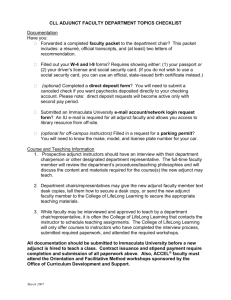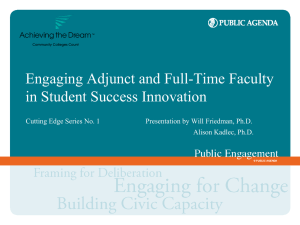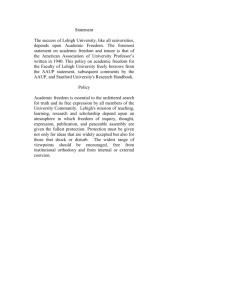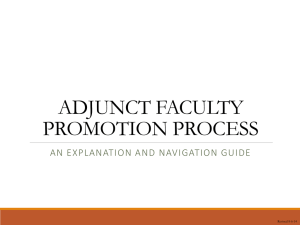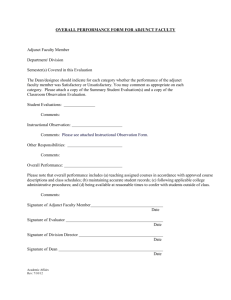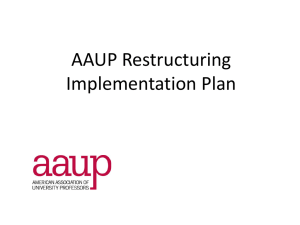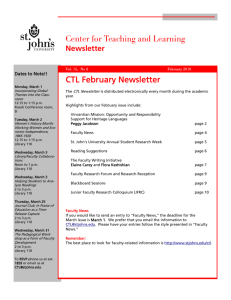Fall 2015 - St. John`s University AAUP chapter
advertisement
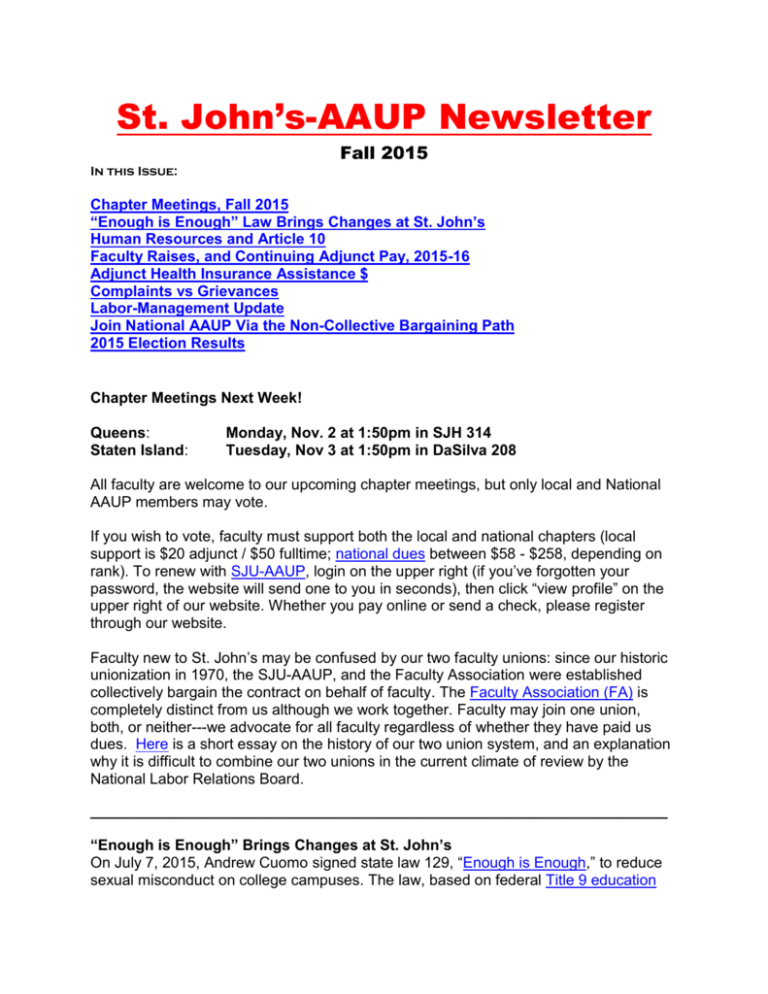
St. John’s-AAUP Newsletter Fall 2015 In this Issue: Chapter Meetings, Fall 2015 “Enough is Enough” Law Brings Changes at St. John’s Human Resources and Article 10 Faculty Raises, and Continuing Adjunct Pay, 2015-16 Adjunct Health Insurance Assistance $ Complaints vs Grievances Labor-Management Update Join National AAUP Via the Non-Collective Bargaining Path 2015 Election Results Chapter Meetings Next Week! Queens: Staten Island: Monday, Nov. 2 at 1:50pm in SJH 314 Tuesday, Nov 3 at 1:50pm in DaSilva 208 All faculty are welcome to our upcoming chapter meetings, but only local and National AAUP members may vote. If you wish to vote, faculty must support both the local and national chapters (local support is $20 adjunct / $50 fulltime; national dues between $58 - $258, depending on rank). To renew with SJU-AAUP, login on the upper right (if you’ve forgotten your password, the website will send one to you in seconds), then click “view profile” on the upper right of our website. Whether you pay online or send a check, please register through our website. Faculty new to St. John’s may be confused by our two faculty unions: since our historic unionization in 1970, the SJU-AAUP, and the Faculty Association were established collectively bargain the contract on behalf of faculty. The Faculty Association (FA) is completely distinct from us although we work together. Faculty may join one union, both, or neither---we advocate for all faculty regardless of whether they have paid us dues. Here is a short essay on the history of our two union system, and an explanation why it is difficult to combine our two unions in the current climate of review by the National Labor Relations Board. _____________________________________________________________________ “Enough is Enough” Brings Changes at St. John’s On July 7, 2015, Andrew Cuomo signed state law 129, “Enough is Enough,” to reduce sexual misconduct on college campuses. The law, based on federal Title 9 education Fall 2015 2 law providing for equal educational access for men and women, mandates strict regulations for college campuses to define and investigate sexual harassment and sexual violence. In response, St. John’s is already updating its Human Resources procedures and student handbook. It is likely that SJU’s administration will organize training sessions for all faculty about the new regulations in upcoming months. The law is part of a national movement to develop better on-campus systems of justice for sexually victimized students. It has also generated a legal countermovement to uphold the rights of the accused. According to the new law, colleges have to investigate complaints within 60 days, keep detailed records, abide by new standards for identifying sexual misconduct, and train officers to handle such complaints. At its core, the law requires students to seek “affirmative consent” to sexual conduct very explicitly and outwardly. The penalty for schools that do not follow the new procedures can include fines and the revocation of a school’s state financial aid package for all students. Similar federal laws also pertain to schools whose students receive federal financial aid. The New York Times described the effects of this law at SUNY Albany in July. To begin educating faculty about “Enough is Enough,” on Oct 7th the St. John's administration organized a meeting of union representatives, as well as all the faculty involved on the university's statutory investigative committees, to hear a briefing from outside legal consultants from the law firm, Cullen and Dykman. The 4-hour meeting was conducted by attorneys James Ryan and Hayley Dryer, who said that Cuomo is probably looking for a college to prosecute for non-compliance of the new state law in the upcoming year. SJU’s administration is trying to be proactive by educating faculty about the new laws and will likely schedule training sessions for all faculty. Guidelines in the St. John’s Student Handbook are already being updated to conform to the new state laws, as is Human Resources policy 704, which pertains to staff and faculty conduct. The New York law follows changes in national regulation following the "Dear Colleague Letter" drafted by the Department of Education in 2011. That letter described proactive measures that schools ought to take to reduce sexual misconduct on campus. A significant complication to the new state and federal legislation, however, arises from the language of equal access in Title 9 itself. Universities have recently been beset by legal suits from students accused of sexual misconduct. These students have argued that in their zeal to protect victimized students from further trauma, schools have abrogated the rights of the accused under the terms of the very same Title 9 laws. In response to these legal challenges, one of which prevailed in July 2015 in a California court, the Department of Education has itself reversed the positions it took on some elements of its own "Dear Colleague" protocols in recent months. According to attorney James Ryan, the legal landscape is changing so quickly that schools need to be vigilant in this unstable period of compliance with state and federal regulation. Fall 2015 3 _________________________________________________________________ Human Resources and Article 10 One of the most difficult negotiations of the last contract (2014-17) was the creation of Article 22 of our contract, which concerns the relationship between faculty governance procedures on one hand, and the office of Human Resources (HR), on the other. Both faculty unions are concerned that faculty governance is slowly being eclipsed by the increasing power of the Human Resources office. Article 22 sets the limits, duration, and scope of HR investigations of faculty (allowing for federal requirements), but its primary weakness lies in changes to HR 704 protocols, over which the faculty and unions have no input. As discussed in this newsletter’s article on governor Cuomo’s “Enough is Enough” law, our university’s lawyers are currently working on changes to 704. Federal guidelines mandate that potential violations of Title 9 educational equal access law (ie: discrimination cases) be investigated by a duly appointed and trained compliance officer. The St. John’s compliance officer is currently employed by the office of Human Resources. However, several cases have come to light recently where the faculty committees, also charged to investigate academic misconduct, have not been properly informed of reports generated by the compliance officer. The complaints, voiced by senior members of the faculty committees involved, cite unprofessional findings by the compliance officer and the withholding of pertinent information from faculty committees. This is a turf struggle where due justice for faculty is at stake. The Human Resources office claims federal law requires it to do its job. Few faculty dispute this power. However, concerning strictly academic matters, even the HR office believes that investigation of faculty should take a different route, outlined in Article 10 of the university statutes. According to Article 10, faculty are investigated by juries of their peers. Peer investigation protocol is typical in universities across the country. There is a problem, however, when cases involve both academic complaints (for example, about grades) and Title 9 protections. Grade retaliation is often part of a discrimination or sexual misconduct claim about faculty, and such cases raise the question of proper jurisdiction. Title 9 officers are in no way empowered, nor trained, to investigate and discipline faculty on academic matters. That job goes to the faculty committees created in Article 10: 1) the Committee for Investigation and Advice on Charges, and 2) the Committee on Hearing and Deciding Charges. At an informational briefing on new Title 9 laws in October (see “Enough is Enough”, faculty and union representatives were told by Title 9 specialist attorney James Ryan that humanities faculty are particularly prone to be investigated under the new state laws and federal guidelines. If students claim sexual or racial discomfort with the academic content of a class, a Title 9 investigation will likely be triggered regardless of the academic nature of the material. These are not cases where professors are accused of lewd conduct or racial slurs, but rather, they are accused of generating a hostile Fall 2015 4 learning environment by discussing controversial material. These scenarios get into the territory of judging potentially “hurtful” discussions, evaluating verbal microaggressions, and measuring the legitimate scope of campus speech codes over intellectual inquiry. (In a series of articles in its September 2015 issue, The Atlantic magazine voiced skepticism over the movement toward new campus speech and behavior codes, esp. “The Coddling of the American Mind.”) The threat is that even if thoughtful and sensitive faculty begin a discussion of difficult topics in class, they may find themselves spending time in the Title 9 compliance office. Persuaded that federal law mandates that faculty be investigated by a compliance office for Title 9 violations, our unions at St. Johns agreed that our contract needed to state exactly what the scope and the process of a Title 9 investigation would be. Previously, investigations conducted by Title 9 officers had no rules or roadmap—faculty were simply told to do what HR demanded. The unions felt this situation was unfair. Article 22 was an attempt to lay out the process so faculty knew their rights, such as the right to accompaniment to HR interviews by a union representative. In terms of the ongoing friction between HR and faculty investigation committees, some faculty feel that the Title 9 compliance officer might be best kept independent of HR. Faculty Raises, 2015-16 Fulltimers: The 2015-16 contract (Article 14, p. 35) stipulates raises of 2.25% for the academic year for continuing faculty members (those who have completed one year of service). Adjuncts: Continuing adjuncts are entitled to the same raise of 2.25%. Please check your pay for the following reason: In one instance the unions are aware of this semester, some confusion has arisen over adjunct pay at different colleges of the university, where “continuously employed adjunct faculty” were not given raises because they had not taught the previous semester at that college. The rules for the definition of continuing employment of adjuncts are soft because of the irregular nature of re-appointment. But, according to the guidelines for Adjunct Health subsidy in Article 15.13 and Appendix C (p.44; 78), adjuncts are defined as “continuing” in 3 ways: From Appendix C: “Continuing adjunct faculty member” shall refer to an adjunct faculty member (i) who has taught in the fall and spring semesters of the preceding academic year; (ii) one whose specialty is such that the particular course is offered in only one of the two semesters of the academic year and the adjunct faculty member has taught such specialty in the two previous semesters in which the course was offered; or (iii) who, in the opinion of the Provost, as a result of past services to the University, should equitably be considered as a continuing adjunct faculty member. If you have not been paid your raise, and feel you meet these criteria, please see a union representative. Fall 2015 5 _________________________________________________________________ Adjunct Health Insurance Assistance Reminder The administration continues to provide annual health insurance assistance to adjuncts who teach regularly at St. John's. Payments may be up to $1500 a year. Faculty must apply by January 31st each year. See Article 15.13, p. 44. Here is a link to the short application form , which must be notarized. Contact Mirian Cepeda (cepedam@stjohns.edu) at Human Resources if you have questions---it is an easy process to apply. Here are the qualifications, according to the Human Resources office: (1) The adjunct must be a continuing adjunct as defined in the contract—see above “Appendix C” on adjunct raises) (2) They must complete a certification no later than January 31 of the year following the year they request the reimbursement. So if they are applying for calendar year 2015 they have until January 31, 2016 to apply. The payment would be made on the next pay, the February 15, 2016 pay (3) Adjuncts who want to apply for 2016 can, but we [the payroll office] would not make the payment until February 15, 2017. We are only required to make the payments once a year, and that is the time period we have chosen as it is after the year that reimbursement is being requested has ended. Graduate Student Adjunct Health Benefits Graduate students who teach are eligible for health care through the university at $1639 a year; new students for spring 2016 will pay $1241: http://www.stjohns.edu/admissionaid/tuition-and-financial-aid/tuition/health-insurance _____________________________________________________________________ Complaints vs. Grievances Faculty often approach AAUP union officers with questions about workplace conditions. These complaints might include poor classroom space, disagreements with colleagues, teaching assignments, and so forth. One of the first things that union representatives consider is whether the complaint is a breach of the terms of the CBA contract or not. If it is, it is treated as a potential grievance. In general, the most complex job of union representatives is to adjudicate grievances of the actual contract. Union officers often work with administrators to negotiate all kinds of general workplace problems, but that is not the same as bringing formal grievances when administrators refuse to acknowledge wrongdoing under the contract. Both fulltime and adjunct faculty can bring a grievance with the help of the unions. For example, if a faculty member is upset not to be invited to the chair’s Christmas party in Forest Hills, that’s a complaint about poor interpersonal skills. And it’s not covered by the contract. Union officers often work out solutions to problems like this, but they have Fall 2015 6 no formal powers to do so. But if faculty members complain that their teaching assignments from the chair are unacceptable, and the department P&B has not been consulted about their preferences, that is a breach of the contract, and the unions have legal recourse if the administration refuses to negotiate. As in any contract, there are gray areas: is adequate office heat covered under the contract? Sadly, no. But “past practices” of working conditions can be, and where there is a clear paper trail of such conduct in a given college, successful grievances have been negotiated on such apparently abstract grounds. Grievances have to be 1) timely. They are brought within 30 days of the event in question. Faculty cannot grieve an event that happened six months or two years ago. When alerted about a grievance, officers will request a “stop clock” from the administration's legal office to get materials assembled. It is up to faculty to alert union officers quickly. 2) To proceed, grievances also have to be supported by both union presidents (the SJU-AAUP, and the FA). Agreement is usually swift, but concerning gray areas of the contract, there might be some persuading to do. And 3) the grievance procedure is used by individual faculty members, or groups of faculty, for remediation of improper treatment under the contract. A department P&B committee, for example, cannot grieve the behavior of unruly faculty members, nor can an administrator. (The procedure for that is to bring formal charges against a faculty member under Article 10 of the university statutes). There are also 4) a number of areas where the contract states that faculty cannot "grieve," such as the outcome of Article 10 proceedings or Merit/Recognition awards. However, even though the outcome of a Recognition award is not technically grievable, oftentimes faculty can grieve faults in administration of the procedure, where the university’s own guidelines were not followed. And finally 5) Grievances pursued through the unions are generally not cases of civil law, such as racial or sexual discrimination, tort liability, or Constitutional rights, except as they pertain to the faculty contract. Faculty who wish to pursue these sorts of claims against the university do so through the outside legal system. In some cases, the unions can offer preliminary counsel from our labor lawyers, but the focus of our work is on labor violations of the contract, not civil law in general. Once union officers assemble the evidence, they will seek remediation through normal administrative channels. Grievances generally begin at the level of the Dean, and move to Provost, and President. (Although faculty often grieve the conduct of their department chair or P&B, the actual grievance begins with the Dean.) Typically, a mutually acceptable solution is brokered at the first stage, and the grievance ends. If the administration denies wrongdoing, however, or the unions and the faculty member Fall 2015 7 feel the administration offer of settlement is inadequate, the case is sent to union lawyers for arbitration by the American Arbitration Association. Typically, the unions split the cost of arbitration with the administration. _____________________________________________________________________ Labor Management Committee Pursuant to the last contract, the Labor Management Committee finally began meeting in the spring of 2015. This committee was actually established during the 2011-14 contract but was never convened during that period. The committee is designed to broker issues on gray areas of the contract where timely workplace decisions have to be made. The topics of the recent meetings have focused on several issues. One of the biggest is the vexing issue of internship compensation at CPS and elsewhere. Different programs across the university use internships in different ways. In some colleges, there has been no faculty compensation for supervising internships, in others they are compensated with varying practices. Discussions are ongoing. Other issues have been tension between Human Resources and faculty governance (ongoing, see this issue’s article); interpretation of the Opt-Up provision (ongoing); P&B protocols for PTR faculty evaluation (resolved); and questions of department governance (also resolved). _____________________________________________________________________ Join National AAUP Via the “Non-Collective Bargaining” Path Supporters of the local chapter must also pay dues to the National AAUP to be eligible to vote in SJU-AAUP chapter meetings and elections. Because SJU is the only AAUP chapter in the nation which does not automatically collect dues from payroll on behalf of the membership, AAUP currently asks St. John’s members to join or renew their National membership through the “non-collective bargaining" payment path on their website. SJU-AAUP does not automatically collect National AAUP dues because our bargaining unit is composed of two unions---The SJU-AAUP, and the Faculty Association (FA). The reasons for this continuing relationship is sketched in the Fall 2008 SJU-AAUP Newsletter. Rest assured, National AAUP knows we are an important chapter---in 1970, we were the first private university in American history collectively bargain---but their website, which was massively overhauled to comply with IRS law in the past several years, does not yet reflect that fact. As compensation, however, our local chapter is emailed a list of our national members in good standing, and we now personally remind our members just before their national membership lapses. You can join the National AAUP here, and use the “non-collective bargaining” pathway: http://www.aaup.org/membership/join Fall 2015 _________________________________________________________________ 2015 SJU-AAUP Election Results In the April 2015, nominations for the 2015-2017 terms were uncontested and the following representatives were elected: Chapter Officers: President Frank Le Veness levenesf@stjohns.edu ext. 5720 Vice President Somnath Pal pals@stjohns.edu ext. 1633 Secretary (Corresponding) John B. Greg gregj@stjohns.edu ext. 2053 Secretary (Recording) Caroline Fuchs fuchsc@stjohns.edu ext. 5050 Treasurer Granville Ganter ganterg@stjohns.edu ext. 5617 Executive Council: College of Professional Studies Catherine Ruggieri ruggierc@stjohns.edu ext. 4385 School of Education --- to be appointed Pharmacy & Allied Health Frank Barile barilef@stjohns.edu ext. 2640 Library ext. 6721 William Keogan keoganw@stjohns.edu Tobin College of Business Joseph Giacalone giacaloj@stjohns.edu ext. 7301 St. John's College Fred Cocozzelli cocozzef@stjohns.edu ext. 5267 At Large Barbara Koziak koziakb@stjohns.edu ext. 5044 At Large Kathryn Shaughnessy shaughnk@stjohns.edu ext. 1454 At Large Charles Traina trainac@stjohns.edu ext. 6166 8
